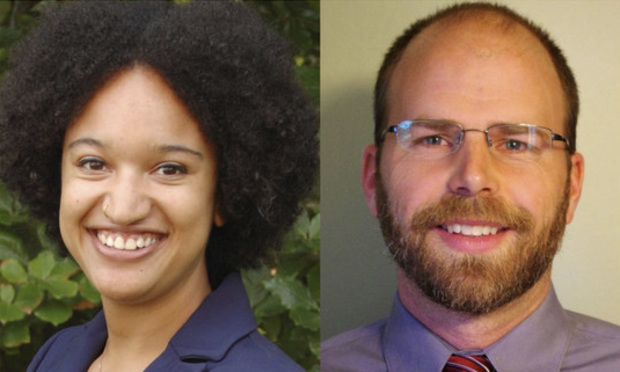First-Ever Skadden Fellows for Two Law Schools, and One of Them Is Closing
The renowned fellowships typically go to graduates from elite schools, but students at a handful of institutions outside the top tier do make the cut as well.
November 30, 2018 at 11:02 AM
4 minute read
 Michaela Bland (left) and Jess Hunter-Bowman (Courtesy photos)
Michaela Bland (left) and Jess Hunter-Bowman (Courtesy photos)
Valparaiso University School of Law and Roger Williams University School of Law have landed their first ever Skadden fellows—a notable achievement considering the bulk of fellows hail from a handful of elite schools.
The highly prized fellowship sends 28 recent graduates into public interest positions for two years and serves as a springboard into those careers. Despite the domination of top law schools, the Skadden Foundation typically selects a handful of students and graduates of schools outside the top tier.
Landing its first Skadden fellow is somewhat bittersweet for Valparaiso Law, which announced last month that it will close by 2020 due to enrollment and fiscal challenges. Newly named fellow Jess Hunter-Bowman graduated from the Indiana law school in 2017. He currently has a federal clerkship in Indiana and will begin working at the National Immigrant Justice Center next year.
From the center's Goshen, Indiana office, Hunter-Bowman plans to represent victims of crime and human trafficking secure immigration relief. He also will work to improve the process for handling immigration applications for that population. Hunter-Bowman is no stranger to the center, having worked there the summer after his second year in law school.
Hunter-Bowman credits Valparaiso with helping him secure the spot on the Skadden fellowship's 2019 class, despite the school's current challenges.
“It has been a tumultuous time for Valparaiso Law School, for the alumni, certainly for the students and especially for the faculty and staff,” he said. “I have appreciated my experience there. I got faculty support when I was applying for the Skadden fellowship. My law school immigration law clinic professor had worked at a large nonprofit organization that got Skadden fellows in the past. He wrote a letter of recommendation for me. It's certainly sad to see that the school is closing.”
Still, Hunter-Bowman said he was surprised to learn he had been selected for the fellowship, which he called the “crème de la crème” for public interest law.
Michaela Bland, a third-year student at Rogers Williams, said she too was shocked by the call that she would be in the next class of Skadden fellows. She thought her interview had gone well, but even then she considered it a long shot.
“I never imagined that out of all the interviews they were doing, I'd be selected as one of the 28 fellows,” she said. “It has been surreal.”
Bland will work with the Rhode Island Center for Justice to disrupt the so-called school-to-prison pipeline. She plans to advocate for children from three East Providence elementary schools during suspension proceedings and raise awareness of the elevated suspension rates among black and Hispanic students as compared to white students. She also will work to improve enforcement of a Rhode Island law prohibiting suspension for behavior than does not pose a serious risk of harm or disruption—a law she said is routinely ignored with minority students.
“You see that a lot of times predominantly black and Hispanic students are suspended for minor infractions such as insubordination or talking back to teachers—nothing that meets the criteria of serious risk of harm or disruption,” she said.
She also hopes to educate Rhode Island parents on how to advocate for their children within the education system. Bland acknowledged that Roger Williams doesn't enjoy the name recognition of a Harvard or Yale law school, but she said the school is an under-the-radar gem.
“A lot of times when people say, 'Where do you go to law school?' and you tell them Roger Williams, they aren't familiar with it,” Bland said. “This law school should be known. It has the most amazing professors. There's a wide range of classes to take, so no matter what you want to pursue, you have options. For me, I selected Roger Williams because of their public interest program.”
This content has been archived. It is available through our partners, LexisNexis® and Bloomberg Law.
To view this content, please continue to their sites.
Not a Lexis Subscriber?
Subscribe Now
Not a Bloomberg Law Subscriber?
Subscribe Now
NOT FOR REPRINT
© 2025 ALM Global, LLC, All Rights Reserved. Request academic re-use from www.copyright.com. All other uses, submit a request to [email protected]. For more information visit Asset & Logo Licensing.
You Might Like
View All
Law Firms Expand Scope of Immigration Expertise Amid Blitz of Trump Orders
6 minute read


Zoom Faces Intellectual Property Suit Over AI-Based Augmented Video Conferencing
3 minute readTrending Stories
- 1Uber Files RICO Suit Against Plaintiff-Side Firms Alleging Fraudulent Injury Claims
- 2The Law Firm Disrupted: Scrutinizing the Elephant More Than the Mouse
- 3Inherent Diminished Value Damages Unavailable to 3rd-Party Claimants, Court Says
- 4Pa. Defense Firm Sued by Client Over Ex-Eagles Player's $43.5M Med Mal Win
- 5Losses Mount at Morris Manning, but Departing Ex-Chair Stays Bullish About His Old Firm's Future
Who Got The Work
J. Brugh Lower of Gibbons has entered an appearance for industrial equipment supplier Devco Corporation in a pending trademark infringement lawsuit. The suit, accusing the defendant of selling knock-off Graco products, was filed Dec. 18 in New Jersey District Court by Rivkin Radler on behalf of Graco Inc. and Graco Minnesota. The case, assigned to U.S. District Judge Zahid N. Quraishi, is 3:24-cv-11294, Graco Inc. et al v. Devco Corporation.
Who Got The Work
Rebecca Maller-Stein and Kent A. Yalowitz of Arnold & Porter Kaye Scholer have entered their appearances for Hanaco Venture Capital and its executives, Lior Prosor and David Frankel, in a pending securities lawsuit. The action, filed on Dec. 24 in New York Southern District Court by Zell, Aron & Co. on behalf of Goldeneye Advisors, accuses the defendants of negligently and fraudulently managing the plaintiff's $1 million investment. The case, assigned to U.S. District Judge Vernon S. Broderick, is 1:24-cv-09918, Goldeneye Advisors, LLC v. Hanaco Venture Capital, Ltd. et al.
Who Got The Work
Attorneys from A&O Shearman has stepped in as defense counsel for Toronto-Dominion Bank and other defendants in a pending securities class action. The suit, filed Dec. 11 in New York Southern District Court by Bleichmar Fonti & Auld, accuses the defendants of concealing the bank's 'pervasive' deficiencies in regards to its compliance with the Bank Secrecy Act and the quality of its anti-money laundering controls. The case, assigned to U.S. District Judge Arun Subramanian, is 1:24-cv-09445, Gonzalez v. The Toronto-Dominion Bank et al.
Who Got The Work
Crown Castle International, a Pennsylvania company providing shared communications infrastructure, has turned to Luke D. Wolf of Gordon Rees Scully Mansukhani to fend off a pending breach-of-contract lawsuit. The court action, filed Nov. 25 in Michigan Eastern District Court by Hooper Hathaway PC on behalf of The Town Residences LLC, accuses Crown Castle of failing to transfer approximately $30,000 in utility payments from T-Mobile in breach of a roof-top lease and assignment agreement. The case, assigned to U.S. District Judge Susan K. Declercq, is 2:24-cv-13131, The Town Residences LLC v. T-Mobile US, Inc. et al.
Who Got The Work
Wilfred P. Coronato and Daniel M. Schwartz of McCarter & English have stepped in as defense counsel to Electrolux Home Products Inc. in a pending product liability lawsuit. The court action, filed Nov. 26 in New York Eastern District Court by Poulos Lopiccolo PC and Nagel Rice LLP on behalf of David Stern, alleges that the defendant's refrigerators’ drawers and shelving repeatedly break and fall apart within months after purchase. The case, assigned to U.S. District Judge Joan M. Azrack, is 2:24-cv-08204, Stern v. Electrolux Home Products, Inc.
Featured Firms
Law Offices of Gary Martin Hays & Associates, P.C.
(470) 294-1674
Law Offices of Mark E. Salomone
(857) 444-6468
Smith & Hassler
(713) 739-1250








